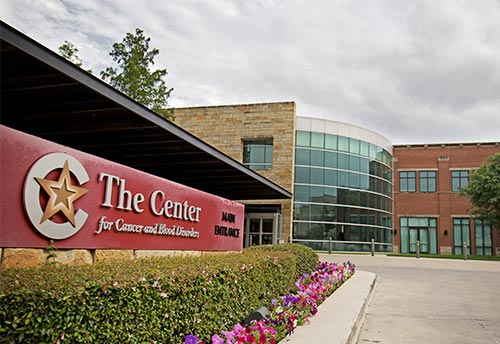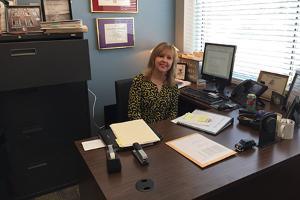Graduate counseling program partners with UNTHSC’s Institute for Patient Safety

Texas Wesleyan graduate counseling students will work with individuals, couples and families that are undergoing treatment at the Center for Cancer and Blood Disorders. Above photo courtesy of the CCBD.
Texas Wesleyan’s graduate counseling program has joined together with UNT Health Science Center (UNTHSC) and the Center for Cancer and Blood Disorders (CCBD) to offer counseling services to CCBD patients through UNTHSC’s Institute for Patient Safety.
The UNTHSC Institute for Patient Safety works with the CCBD to expand patient access to supportive services such as palliative care, prehab/rehab for chemotherapy patients, medication management and, now, counseling services for patients going through treatment and end of life issues.
“The students and faculty associated with Texas Wesleyan’s graduate counseling programs came highly recommended,” said Amanda Hodges BSN, RN, OCN and director of clinical programs & support services for the CCBD, said. “Counseling services are extremely important and we are excited that Texas Wesleyan will partner with us to support our patients.”
Texas Wesleyan graduate counseling students will work with individuals, couples and families that are undergoing treatment at the CCBD.
“One of our practicum students has already been screened and accepted to work with their patients,” Linda Metcalf, Ph.D., director of Texas Wesleyan’s graduate counseling programs, said. “I have really enjoyed getting to know the CCBD staff and learning how we can be helpful.”
The Institute for Patient Safety, launched in May 2016, was founded by UNTHSC, Texas Christian University, JPS Health Network and Cook Children’s Medical Center. The institute aims to take a lead role in professional and community education, research and quality improvement projects to reduce medical errors and assure Texans receive the highest quality health care.
About Texas Wesleyan’s graduate counseling programs
The graduate counseling programs at Texas Wesleyan provide counseling students with opportunities to examine various theoretical models and perfect their skills through experiences inside and outside the classroom, including clinical practice at Texas Wesleyan’s Community Counseling Center. Experienced faculty act as consultants and resources to all students so, upon completion of degree requirements, they are prepared to pursue licensure.
Texas Wesleyan offers three master's-level graduate counseling programs: Professional Counseling, Marriage & Family Therapy and School Counseling; as well as a doctoral studies program in Marriage & Family Therapy.
About Texas Wesleyan’s Community Counseling Center
Texas Wesleyan’s Community Counseling Center, created in 2007, is a community service program that gives the University’s masters and doctoral counseling students clinical experience under watchful eyes. In 2015, the center moved to its brand-new, 6,000 square-foot office on E. Rosedale Street, as part of Texas Wesleyan’s 2020 Vision strategic plan to revitalize its neighborhood and spur economic growth in East Fort Worth.
Each of the eight treatment rooms in the new space are connected to an observation room with a one-way window and a recording system that allows other students and faculty to observe the sessions live, or review them later in the center’s technology room.
Between 1,500 and 1,600 clients from around Tarrant County come to the center each year for help with depression, anger, anxiety, behavioral problems and more. Some are dealing with things like HIV or homelessness. They are usually referred to the center from local groups, including the Fort Worth Independent School District, Catholic Charities, the Salvation Army and local churches. Clients pay on a sliding scale.

Above: Linda Metcalf is the director of Texas Wesleyan’s graduate counseling programs.







